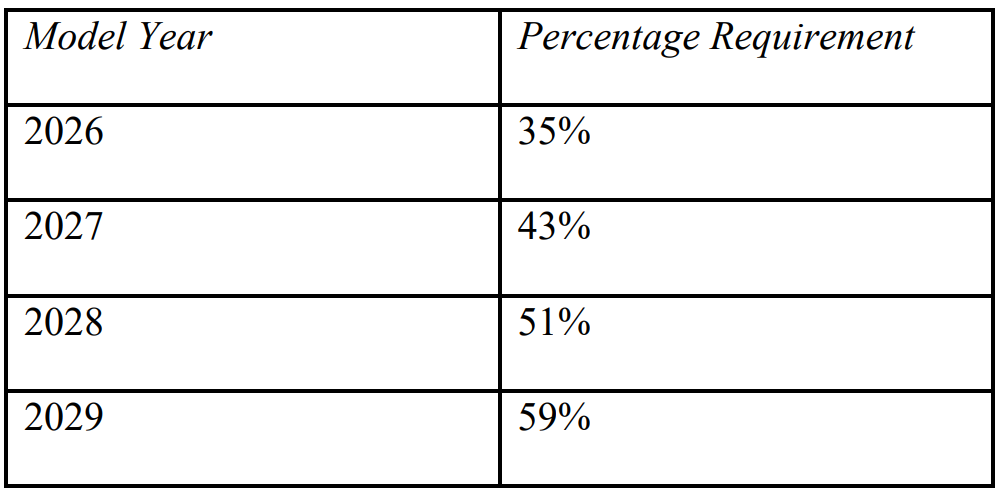
NJ looking to adopt California clean cars rules, public comment now open
By onAnnouncements
New Jersey Gov. Phil Murphy’s proposal that would require automakers to ramp up light-duty zero-emission vehicles (ZEVs) is now up for public comment through Oct. 20.
Called the Advanced Clean Cars II (ACCII) proposal, it incorporates California’s ACCII with the goal of 100% ZEVs by 2035. Public comments can be given here, in the New Jersey Register. A public hearing will be held on Sept. 21 at 9:30 a.m.
“This proposed rulemaking represents a continuation of the Department’s efforts to mitigate the impacts of climate change by reducing greenhouse gas emissions and short-lived climate pollutants,” the proposal states. “Emissions from the transportation sector constitute the largest source of climate pollution in New Jersey.”
If approved, the regulation would also implement more stringent multi-pollutant exhaust emission standards for internal combustion engine (ICE) passenger vehicles, light-duty trucks, and medium-duty vehicles.
“By increasing ZEV sales and the stringency of the multi-pollutant exhaust emission standards, the Department will reduce emissions of carbon dioxide (CO2) and local air pollutants, like nitrogen oxides (NOx) and fine particulate matter (PM2.5), from the transportation sector,” the proposal states.
The rule wouldn’t impose any obligations on consumers or car dealers and provides compliance flexibilities for manufacturers, including a credit trading mechanism, according to Murphy’s office. Credits are banked when OEMs meet compliance standards.
In July, Murphy announced the state had signed Section 2C of the Accelerating to Zero Coalition’s Zero Emission Vehicle (ZEV) Declaration. The global agreement was launched by the UK at the 26th United Nations Climate Change Conference of the Parties (COP26) in November 2021. It has been signed by 41 national governments and 74 cities, states, and regional governments including several U.S. states and cities.
Section 2C commits the state to a zero-emission vehicle future in alignment with the Paris Agreement goals. The agreement is a legally binding international treaty that was agreed to by 196 parties in 2015 to combat climate change.
“By filing the ACCII proposal, we build upon our nation-leading record of bold climate action while delivering on our promise to utilize every tool at our disposal to combat the intensifying climate crisis,” Murphy said in July. “Our commitment to bringing the ACCII proposal to fruition is a commitment to every New Jersey family and the air they breathe, air that will be cleaner and healthier tomorrow thanks to the steps we’re taking to reduce emissions today. That commitment is underscored by our signing of the ZEV Declaration, which recognizes that New Jersey is just one crucial piece of our global response to climate change.”
The state’s recently adopted budget includes a new $10 million appropriation to support the increasing number of electric vehicles (EVs) on the road. The New Jersey Department of Environmental Protection will use these funds to meet demand for the installation of charging stations at businesses, multi-unit residential buildings, and public locations, according to Murphy’s office.
The ACC II program’s annual ZEV requirement for model years 2026 through 2035 or later is shown in the chart below:
Murphy’s proposal hasn’t come without criticism including business groups, trade organizations, and lawmakers. Concerns include cost, negative effects on vehicle affordability and consumer choice, strain on the state’s energy grid, and implementation of the rule, according to NJBIZ. The Fuel Merchants Association of New Jersey, New Jersey Propane Gas Association, New Jersey Coalition of Automotive Retailers (NJCAR), and New Jersey Business & Industry Association (NJBIA) are among the trade organizations that have voiced opposition to the proposal.
“In the end, consumers will decide when New Jersey becomes a 100% EV market, NOT government decision-makers or a governor who won’t even be in office when these mandates kick in and won’t have to deal with the economic and consumer impacts of ACCII,” said Jim Appleton, NJCAR president, according to NJBIZ. “Adopting this California policy, when more flexible options are available, is ill-advised.”
The proposal is backed by Environmental Protection Commissioner Shawn M. LaTourette and Board of Public Utilities President Joseph L. Fiordaliso.
LaTourette said New Jersey has “the power and obligation to reduce its effects by limiting the emissions of climate pollutants.”
Fiordaliso said actions taken now to increase the number of EVs on the road are “vitally important to fighting the ravages of climate change.”
“As we know, the state’s transportation sector accounts for more than 40 percent of the state’s greenhouse gas emissions,” he said. “Filing the ACC II proposal with OAL and signing the COP 26 declaration will go a long way toward providing a cleaner, healthier environment for all New Jerseyans for generations to come.”
New Jersey Policy Perspective, ChargEVC-NJ, Natural Resources Defense Council, Environment New Jersey, New Jersey LCV, and Sierra Club also back the proposal.
Images
Featured image credit: NicoElNino/iStock

